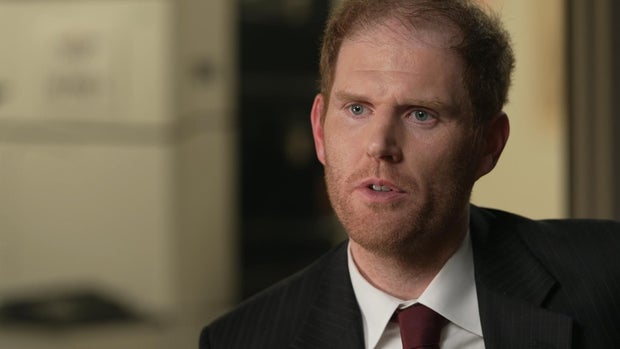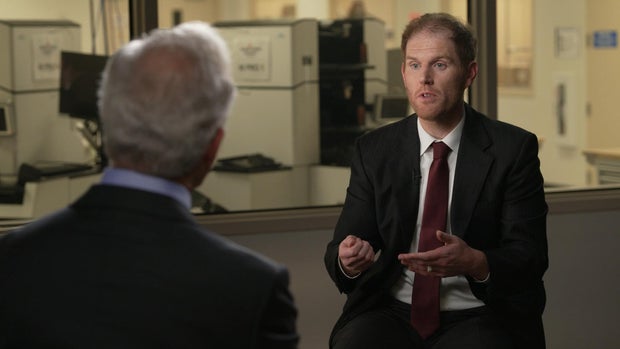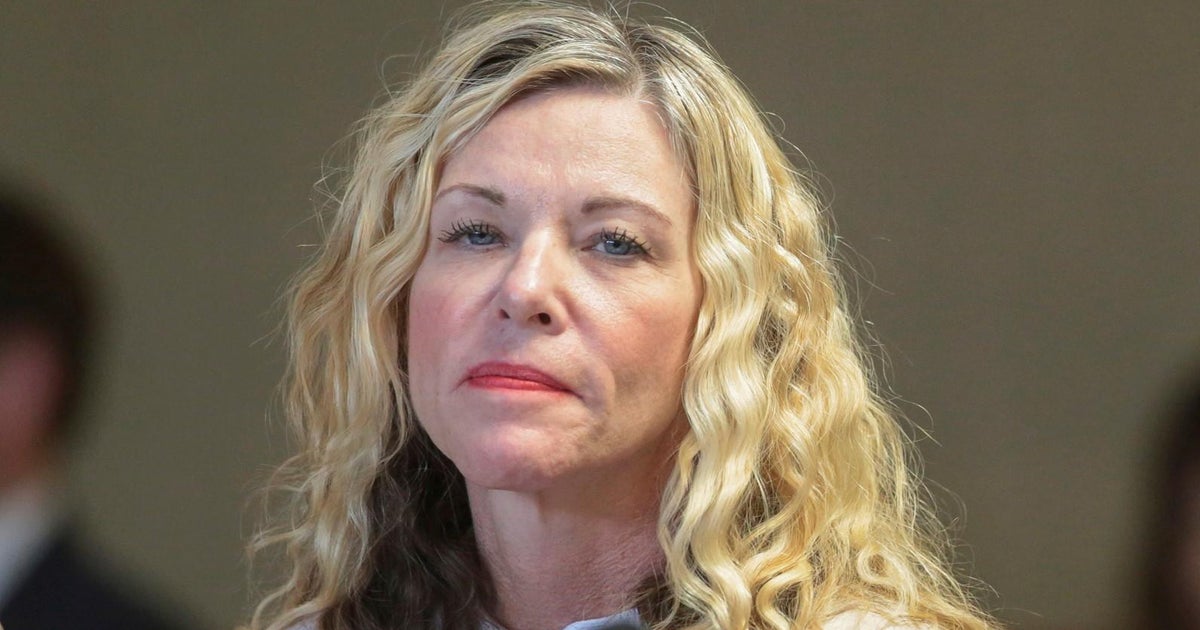CBS News
Arizona election officials work to restore confidence in results | 60 Minutes

With Donald Trump pulling out of his “60 Minutes” interview tonight, we’ll turn to a different Republican who is paying the price for Trump’s claims of a stolen 2020 election. Stephen Richer helps administer voting in Maricopa County, Arizona. That’s Phoenix and home to 60% of Arizona voters. Maricopa is often decisive in a state which swings either way. Trump claimed Maricopa county was stolen in 2020. Republican Stephen Richer was determined to find the truth — to restore belief in the ballot. He discovered that truth wasn’t what many wanted to hear.
Stephen Richer: I’ve become much more cynical about politics. There are a lot of people who have no lines in the sand. A lot of politicians. A lot of politicians for whom it’s like oxygen, that if you told them they weren’t going to be reelected, it would be like unplugging them from oxygen. So whichever way the winds are blowing, even if it’s highly immoral, that they’re on– they’re on for the ride.
Scott Pelley: What are your fears for this coming Election Day?
Stephen Richer: That we’ll, we’ll be doing this again for another four years.
Nearly four years ago, Republican attorney Stephen Richer was the voter’s choice for Maricopa County recorder, the office that records voter registration and handles ballots by mail. Richer took office after the 2020 vote when his own party was up in arms over allegations of fraud. It was Richer’s first elected office and he knew what to do.
Stephen Richer: They just need answers. It– it– it’s not that complicated of an issue. It’s just people are uncertain. They expected Donald Trump to win. I expected Donald Trump to win in Maricopa County. He didn’t win. They have questions. As soon as we give them logical, factual answers, all will be well.
Scott Pelley: And that’s not what happened?
Stephen Richer: That is not what happened.
60 Minutes
The ‘logical, factual’ answers came after multiple investigations. A hand recount of Maricopa County’s 2.1 million paper ballots confirmed Joe Biden won. Statewide, prosecutions for illegal voting involved a total of 19 ballots. In Maricopa, 50 ballots had been counted twice for a typical reason.
Stephen Richer: Somebody made a mistake. A human being made a mistake. There were 2.1 million ballots cast in the 2020 election. These 50 shouldn’t have been tabulated. By no means were the 50 all for one candidate or another, so it had a negligible impact on the actual contest.
Negligible too, because Trump lost Maricopa County by 45,109 votes.
Scott Pelley: What evidence of widespread fraud was found in Maricopa County in 2020?
Stephen Richer: Oh, none. And I would say Maricopa County’s 2020 election is the most scrutinized election in human history.
Scott Pelley: When you began to tell your fellow Republicans in Maricopa County that the election was fair and there was no fraud that would change the outcome, how did they react to you?
Stephen Richer: Not well. Yeah. Not well at all.
They included Trump, who said, “the entire database of Maricopa County in Arizona has been deleted.(!)” He called it an “unbelievable election crime.”
Stephen Richer: It was a Saturday afternoon, and I was in the office looking at the very thing that he was– saying we had deleted. And so just sort of the– like, the– the– the– the ludicrous nature of it, it just is– is– is offensive.
Scott Pelley: What did you say in response to what the president had written?
Stephen Richer: I said something like, “This is unhinged. I’m looking at the voter registration database right now. These lies have to stop. This is as disprovable as saying two plus two equals five.“
Scott Pelley: And the reaction was what?
Stephen Richer: The reaction was significant.
Three violent threats to Stephen Richer have been prosecuted. One man got three-and-a-half years. The others are awaiting trial.
Undaunted, Richer explained the facts. Here, in 2021, he was heckled and followed to his car.
Stephen Richer: People were banging on my windshield as I got into the car.
Scott Pelley: What were they shouting?
Stephen Richer: “Turncoat,” “You’re wrong,” “You’re an idiot,” “Don’t be a traitor,” “How could you?”
The fever has never broken. This was three months ago.
Stephen Richer: I do not believe the 2020 election was stolen.
Response: Boooooo!
Scott Pelley: So why do so many people remain passionately unconvinced?
Stephen Richer: I think it has become– the– the– the tattoo. I think it has become the tattoo to show that you’re a true believer of the movement.
60 Minutes
Scott Pelley: You believe the election was stolen.
Shelby Busch: I do.
Shelby Busch started a political action committee which investigates what she calls widespread fraud in Maricopa County—fraud no credible investigation has found. She’s taken in nearly a million dollars in donations for the work of her PAC. And the Arizona Republican Party awarded her the leadership of its delegation at last summer’s national convention.
Shelby Busch: …and that’s why I, Shelby Busch, the delegation chair and our wonderful state chairwoman Gina Swoboda and this entire delegation counts their 43 delegates to Donald J. Trump.
Scott Pelley: You are a rising star in the state party.
Shelby Busch: Well, I definitely have brought some attention onto myself, that is for sure.
Scott Pelley: What do you believe happened in the Maricopa vote in 2020?
Shelby Busch: I believe that fraudulent votes were put into the system. I also believe that a lot of– state statutes and regulations and policies were broke, which makes the election questionable at best.
Busch still questions whether signature verification was proper and whether some ballots were collected illegally. She’s an administrator in a medical practice.
Scott Pelley: You’re self-educated–
Shelby Busch: That’s correct–
Scott Pelley: –when it comes to elections.
Shelby Busch: That’s correct.
Scott Pelley: In a recent case a judge disqualified you from testifying in the case because he said you were, quote, “Obviously unqualified… not even in the ballpark.”
Shelby Busch: That’s one judge’s opinion. who is a radical leftist who is legislating from the bench and I don’t believe that it had any merit in my credibility whatsoever.
Scott Pelley: Is there a danger in undermining people’s faith in the election system by persisting with these conspiracy theories that no one has been able to validate?
Shelby Busch: Again, I’m going to disagree with you, sir, respectfully– it has been validated. And because–
Scott Pelley: Where? By whom?
Shelby Busch: The election officials–
Scott Pelley: Give me– give me a court case. Give me something.
Shelby Busch: I don’t need a government official with a vested interest in disproving information to tell me whether what I have is valid. It’s up to each individual citizen, as a member of this society, to review the evidence, to think for themselves and make those decisions.
Scott Pelley: It’s valid ’cause you say it is.
Shelby Busch: I say it’s valid because I say it is. And if somebody looks at it, they can determine whether it’s valid. The evidence speaks for itself. Data does not lie. Data doesn’t lie. Election officials do.
Ben Ginsberg: The election was not stolen, it was lost.
Attorney Ben Ginsberg has represented the Republican Party in many of its most important election cases. In 2022, he joined conservative judges and senators in “Lost, Not Stolen,” an investigation that exposes election fraud lies. Part of it centers on Trump’s swing state lawsuits.
Alex Wong/Getty Images
Ben Ginsberg: Donald Trump and his supporters brought 64 cases. They lost 63 of them outright. There was one that was a partial victory involving 200 votes, far from outcome determinative.
Scott Pelley: And all of that told you what?
Ben Ginsberg: The evidence to back up the allegations of fraud and elections being unreliable simply does not exist.
Scott Pelley: The election deniers in Arizona will say, “We did lose all those cases, but the judges weren’t fair.”
Ben Ginsberg: Under the rule of law, you have every right to submit your litigation. But under the rule of law, a conservative principle, a Republican principle for as long as I’ve been practicing election law, you have to accept the rulings of the court.
Shelby Busch: I don’t have time, frankly, to worry about whether people believe me or question my integrity. I have what I believe is the mission that I am on, and that mission is for my children and my grandchildren. I’m not here to make friends. I am here to do a job.
Scott Pelley: Where does that mandate for that mission come from?
Shelby Busch: It comes from my own personal drive, and it also comes from, I believe, a calling from God.
It has been a calling for many, over nearly four years, in meetings of the Republican-led Maricopa County Board of Supervisors, which certifies the vote.
Scott Pelley: Have you been accused of treason?
Clint Hickman: Oh yeah. treason– murdering fellow officials that would talk.
Republican Clint Hickman has been a county supervisor 11 years. In 2020 he was among Trump’s most loyal supporters.
Clint Hickman: Still proud that he took the time to call me out and thank me for the work that I was trying to accomplish
But Hickman saw no evidence of fraud and said so when he voted to certify the election.
Scott Pelley: You’ve received a number of death threats.
Clint Hickman: I’ve lost count. I have lost count. And so have my colleagues. And so have– so have election workers.
Scott Pelley: Well, you’ve lost count, but here’s one.
Voicemail: Hello Mr. Hickman, I am glad that you are standing up for democracy and want to place your hand on the Bible and say that the election was honest and fair. I really appreciate that. When we come to lynch your stupid lying Commie ass, you’ll remember that you lied on the f***ing Bible, you piece of s**t. You’re gonna die, you piece of s**t. We’re going to hang you. We’re going to hang you.
That man is in prison for two-and-a-half years. But there were others.
60 Minutes
Clint Hickman: But the chilling one that you didn’t play is one of the guys said, “We know the restaurants that you are in. And we know where your kids go to school.”
Menace grew in the shadows and emerged on the stage.
Shelby Busch: I hear the word “unity” and I get sick to my stomach. Because there is a lot of earthly, fake and vile unity talk going around in our state.
This is Shelby Busch, the Maricopa County Republican Party vice-chair, talking about fellow Republican Stephen Richer this past March.
Shelby Busch: So what does unity mean to me? It means unifying with those that share the core biblical, Christian—Judeo principles that we share. That’s unity. But if Stephen Richer walked in this room, I would lynch him. I don’t unify with people who don’t believe in the principles we believe in and the American cause that founded this country.
Scott Pelley: When you heard Shelby Busch say that she would lynch you–
Stephen Richer: Yeah.
Scott Pelley:–you thought what?
Stephen Richer: I first thought like, “Why is that word in your vocabulary?” Lynch is a weirdly historically loaded and oddly specific term.
Busch offered a modified definition of lynching.
Shelby Busch: I think many people are familiar with a political lynching. It’s– it’s referred to as– destroying someone’s career. It was not ever meant physically in any way, shape, or form. Probably a poor choice of words.
Scott Pelley: You have seen the unrest in this county. The civil disorder in this county. You’re contributing to that.
Shelby Busch: What I am doing is I am shining a big bright light on the disdain and the arrogance of some of the elected officials. They are elected to represent the interests of the people. And until they are ready to step up and do that, then there will be unrest.
Scott Pelley: Is election denialism a swindle?
Stephen Richer: Oh, 100% so for some people. It’s a swindle emotionally for some. It’s a swindle politically for some. It’s a swindle economically for some.
This past July, Stephen Richer ran in the primary for reelection. He lost to a fellow Republican who said Maricopa elections are a “laughing stock.” Richer moves on after this election, leaving behind his enduring contribution — the fortress defenses around the center where the votes are counted—a wall to defend America from Americans.
Stephen Richer: I have seen some ugliness in the character of human beings. It has given me great insight into horrific moments of human history. I would look at some of these historical moments and say, like, “Well, that– that–that couldn’t happen here.” But moments like these begin to give you insight on how stuff like that can build up, how the animal passions, how going along with the crowd, how the emotions of just being your side versus their side. It’s just to say that some of the same human impulses– that I didn’t understand, I now do understand.
Scott Pelley: You understand how things can go wrong?
Stephen Richer: I understand how a society of educated people can do something truly horrible.
Produced by Aaron Weisz and Ian Flickinger. Broadcast associate, Michelle Karim. Edited by Sean Kelly.
CBS News
Gisèle Pelicot’s husband found guilty in mass rape trial in France

A judge in France on Thursday found the former husband of Gisèle Pelicot, who admitted to drugging and raping her repeatedly over the course of almost a decade and inviting dozens of other men to assault her as well, guilty of aggravated rape. Over the course of her trial, Pelicot — who insisted her full name be published and proceedings be made public — has been praised for her courage and become a symbol of the fight against sexual violence in France and around the world. The judge on Thursday was reading out verdicts for dozens of other men also accused of raping her.
Pelicot arrived Thursday at the court in Avignon, southeast France, where crowds had gathered outside holding signs saying: “Thank you for your courage.”
The trial began on Sept. 2, and almost every day, Pelicot came face to face with her former husband, Dominique, or one of the 49 other men charged with raping her. One other man faced a charge of aggravated sexual assault. She insisted that videos submitted as evidence, made by her ex-husband showing men sexually assaulting her while she appeared to be unconscious, be shown in open court.
The assaults took place between 2011 and 2020, when Dominique Pelicot was taken into custody. Police found thousands of photos and videos of the abuse on his computer drives, which helped lead them to other suspects. Some of the men testified they thought the unconscious woman was OK with it, or that her husband’s permission was enough.
“Gisèle Pelicot thinks that this shock wave is necessary, so that no one can say after this: ‘I didn’t know this was rape,'” her attorney, Stéphane Babonneau, told The Associated Press.
“It’s not for us to feel shame — it’s for them,” Pelicot said in court, referring to the attackers. “Above all, I’m expressing my will and determination to change this society.”
Controversial French laws
Pelicot’s case triggered protests across France, and there was hope among some demonstrators that the case could lead to changes in controversial French laws governing sexual consent.
France introduced a legal age of sexual consent in 2021 after a public outcry over the rape of an 11-year-old schoolgirl by a man who was initially convicted on a lesser charge. Since then, sex with anyone under the age of 15 has been viewed as non-consensual, but French law does not refer to consent in cases involving older victims.
Under French law, rape is defined as penetration or oral sex using “violence, coercion, threat or surprise,” without taking consent into account, according to the Reuters news agency. Prosecutors must, therefore, prove an intention to rape if they are to be successful in court, legal experts told Reuters.
Just 14% of rape accusations in France lead to formal investigations, according to a study by the Institute of Public Policies.
“Why don’t we manage to obtain convictions? The first reason is the law,” legal expert Catherine Le Magueresse told Reuters. “The law is written in such a way that victims must comply with the stereotype of a ‘good victim’ and a ‘true rape’: an unknown attacker, use of violence, and the victim’s resistance. But it is only true for a minority of rapes.”
“I’m trying to understand”
Speaking in court during the trial, Pelicot, who is 72, talked about how she had thought she was in a loving marriage with her husband and would never have guessed that he was drugging her.
“We would have a glass of white wine together. I never found anything strange about my potatoes,” Pelicot told the court.
“We finished eating. Often when it’s a football match on TV, I’d let him watch it alone. He brought my ice cream to my bed, where I was. My favorite flavor — raspberry — and I thought: ‘How lucky I am. He’s a love.'”
She said she didn’t have any sensation of being drugged.
“I never felt my heart flutter. I didn’t feel anything. I must have gone under very quickly. I would wake up with my pajamas on,” Pelicot told the court, adding that she would sometimes wake up “more tired than usual, but I walk a lot and thought it was that.”
“I’m trying to understand,” she said, “how this husband, who was the perfect man, could have got to this.”
CBS News
Teamsters going on strike against Amazon at several locations nationwide

The International Brotherhood of Teamsters says workers at seven Amazon facilities will begin a strike Thursday morning in an effort by the union to pressure the e-commerce giant for a labor agreement during a key shopping period.
The Teamsters say the workers, who authorized walkouts in the past few days, are joining the picket line after Amazon ignored a Dec. 15 deadline the union set for contract negotiations. Amazon says it doesn’t expect any impact on its operations during what the union calls the largest strike against the company in U.S. history.
The Teamsters say they represent nearly 10,000 workers at 10 Amazon facilities, a small portion of the 1.5 million people Amazon employs in its warehouses and corporate offices.
Amazon is ranked No. 2 on the Fortune 500 list of the nation’s largest companies.
At a warehouse in the New York City borough of Staten Island, thousands of workers who voted for the Amazon Labor Union in 2022 and have since affiliated with the Teamsters. At the other facilities, employees – including many delivery drivers – have unionized with them by demonstrating majority support but without holding government-administered elections.
The strikes happening Thursday are taking place at an Amazon warehouse in San Francisco and six delivery stations in southern California, New York City, Atlanta and the Chicago suburb of Skokie, Illinois, according to the union’s announcement. Amazon workers at the other facilities are “prepared to join” them, the union said.
“Amazon is pushing its workers closer to the picket line by failing to show them the respect they have earned,” Teamsters General President Sean M. O’Brien said in a statement.
“If your package is delayed during the holidays, you can blame Amazon’s insatiable greed. We gave Amazon a clear deadline to come to the table and do right by our members. They ignored it,” he said.
The Seattle-based online retailer has been seeking to re-do the election that led to the union victory at the warehouse on Staten Island, which the Teamsters now represent. In the process, the company has filed a lawsuit challenging the constitutionality of the National Labor Relations Board.
Meanwhile, Amazon says the delivery drivers, which the Teamsters have organized for more than a year, aren’t its employees. Under its business model, the drivers work for third-party businesses, called Delivery Service Partners, who drop off millions of packages to customers everyday.
“For more than a year now, the Teamsters have continued to intentionally mislead the public – claiming that they represent ‘thousands of Amazon employees and drivers’. They don’t, and this is another attempt to push a false narrative,” Amazon spokesperson Kelly Nantel said in a statement. “The truth is that the Teamsters have actively threatened, intimidated, and attempted to coerce Amazon employees and third-party drivers to join them, which is illegal and is the subject of multiple pending unfair labor practice charges against the union.“
The Teamsters have argued Amazon essentially controls everything the drivers do and should be classified as an employer.
Some U.S. labor regulators have sided with the union in filings made before the NLRB. In September, Amazon boosted pay for the drivers amid the growing pressure.
CBS News
Teamsters set to strike against Amazon at New York City warehouse

NEW YORK — The Teamsters union is launching a strike against Amazon at numerous locations across the country, including in Maspeth, Queens.
The Teamsters are calling it the largest strike against Amazon in United States history, and it’s set to begin at 6 a.m. Thursday. In addition to New York City, workers will be joining picket lines in Atlanta, Southern California, San Francisco and Illinois.
In a video announcement released Wednesday night, workers voiced their frustrations.
“Us being strike ready means we’re fed up, and Amazon is clearly ignoring us and we want to be heard,” one worker says in the video.
“It’s really exciting. We’re taking steps for ourselves to win better conditions, better benefits, better wages,” another worker in the video says.
The union says it represents about 10,000 Amazon employees and that Amazon ignored a deadline to come to the table and negotiate. The $2 trillion company doesn’t pay employees enough to make ends meet, the union asserts.
At the height of the holiday season, many are wondering what this means for packages currently in transit.
Teamsters President Sean O’Brien said, “If your package is delayed during the holidays, you can blame Amazon’s insatiable greed.”
Amazon says Teamsters are misleading the public
An Amazon spokesperson says the Teamsters are misleading the public and do not represent any Amazon employees, despite any claims.
“The truth is that the Teamsters have actively threatened, intimidated, and attempted to coerce Amazon employees and third-party drivers to join them, which is illegal and is the subject of multiple pending unfair labor practice charges against the union,” the spokesperson said in a statement.
An Amazon representative says the company doesn’t expect operations to be impacted.
CBS News
Arizona election officials work to restore confidence in results | 60 Minutes

With Donald Trump pulling out of his “60 Minutes” interview tonight, we’ll turn to a different Republican who is paying the price for Trump’s claims of a stolen 2020 election. Stephen Richer helps administer voting in Maricopa County, Arizona. That’s Phoenix and home to 60% of Arizona voters. Maricopa is often decisive in a state which swings either way. Trump claimed Maricopa county was stolen in 2020. Republican Stephen Richer was determined to find the truth — to restore belief in the ballot. He discovered that truth wasn’t what many wanted to hear.
Stephen Richer: I’ve become much more cynical about politics. There are a lot of people who have no lines in the sand. A lot of politicians. A lot of politicians for whom it’s like oxygen, that if you told them they weren’t going to be reelected, it would be like unplugging them from oxygen. So whichever way the winds are blowing, even if it’s highly immoral, that they’re on– they’re on for the ride.
Scott Pelley: What are your fears for this coming Election Day?
Stephen Richer: That we’ll, we’ll be doing this again for another four years.
Nearly four years ago, Republican attorney Stephen Richer was the voter’s choice for Maricopa County recorder, the office that records voter registration and handles ballots by mail. Richer took office after the 2020 vote when his own party was up in arms over allegations of fraud. It was Richer’s first elected office and he knew what to do.
Stephen Richer: They just need answers. It– it– it’s not that complicated of an issue. It’s just people are uncertain. They expected Donald Trump to win. I expected Donald Trump to win in Maricopa County. He didn’t win. They have questions. As soon as we give them logical, factual answers, all will be well.
Scott Pelley: And that’s not what happened?
Stephen Richer: That is not what happened.
60 Minutes
The ‘logical, factual’ answers came after multiple investigations. A hand recount of Maricopa County’s 2.1 million paper ballots confirmed Joe Biden won. Statewide, prosecutions for illegal voting involved a total of 19 ballots. In Maricopa, 50 ballots had been counted twice for a typical reason.
Stephen Richer: Somebody made a mistake. A human being made a mistake. There were 2.1 million ballots cast in the 2020 election. These 50 shouldn’t have been tabulated. By no means were the 50 all for one candidate or another, so it had a negligible impact on the actual contest.
Negligible too, because Trump lost Maricopa County by 45,109 votes.
Scott Pelley: What evidence of widespread fraud was found in Maricopa County in 2020?
Stephen Richer: Oh, none. And I would say Maricopa County’s 2020 election is the most scrutinized election in human history.
Scott Pelley: When you began to tell your fellow Republicans in Maricopa County that the election was fair and there was no fraud that would change the outcome, how did they react to you?
Stephen Richer: Not well. Yeah. Not well at all.
They included Trump, who said, “the entire database of Maricopa County in Arizona has been deleted.(!)” He called it an “unbelievable election crime.”
Stephen Richer: It was a Saturday afternoon, and I was in the office looking at the very thing that he was– saying we had deleted. And so just sort of the– like, the– the– the– the ludicrous nature of it, it just is– is– is offensive.
Scott Pelley: What did you say in response to what the president had written?
Stephen Richer: I said something like, “This is unhinged. I’m looking at the voter registration database right now. These lies have to stop. This is as disprovable as saying two plus two equals five.“
Scott Pelley: And the reaction was what?
Stephen Richer: The reaction was significant.
Three violent threats to Stephen Richer have been prosecuted. One man got three-and-a-half years. The others are awaiting trial.
Undaunted, Richer explained the facts. Here, in 2021, he was heckled and followed to his car.
Stephen Richer: People were banging on my windshield as I got into the car.
Scott Pelley: What were they shouting?
Stephen Richer: “Turncoat,” “You’re wrong,” “You’re an idiot,” “Don’t be a traitor,” “How could you?”
The fever has never broken. This was three months ago.
Stephen Richer: I do not believe the 2020 election was stolen.
Response: Boooooo!
Scott Pelley: So why do so many people remain passionately unconvinced?
Stephen Richer: I think it has become– the– the– the tattoo. I think it has become the tattoo to show that you’re a true believer of the movement.
60 Minutes
Scott Pelley: You believe the election was stolen.
Shelby Busch: I do.
Shelby Busch started a political action committee which investigates what she calls widespread fraud in Maricopa County—fraud no credible investigation has found. She’s taken in nearly a million dollars in donations for the work of her PAC. And the Arizona Republican Party awarded her the leadership of its delegation at last summer’s national convention.
Shelby Busch: …and that’s why I, Shelby Busch, the delegation chair and our wonderful state chairwoman Gina Swoboda and this entire delegation counts their 43 delegates to Donald J. Trump.
Scott Pelley: You are a rising star in the state party.
Shelby Busch: Well, I definitely have brought some attention onto myself, that is for sure.
Scott Pelley: What do you believe happened in the Maricopa vote in 2020?
Shelby Busch: I believe that fraudulent votes were put into the system. I also believe that a lot of– state statutes and regulations and policies were broke, which makes the election questionable at best.
Busch still questions whether signature verification was proper and whether some ballots were collected illegally. She’s an administrator in a medical practice.
Scott Pelley: You’re self-educated–
Shelby Busch: That’s correct–
Scott Pelley: –when it comes to elections.
Shelby Busch: That’s correct.
Scott Pelley: In a recent case a judge disqualified you from testifying in the case because he said you were, quote, “Obviously unqualified… not even in the ballpark.”
Shelby Busch: That’s one judge’s opinion. who is a radical leftist who is legislating from the bench and I don’t believe that it had any merit in my credibility whatsoever.
Scott Pelley: Is there a danger in undermining people’s faith in the election system by persisting with these conspiracy theories that no one has been able to validate?
Shelby Busch: Again, I’m going to disagree with you, sir, respectfully– it has been validated. And because–
Scott Pelley: Where? By whom?
Shelby Busch: The election officials–
Scott Pelley: Give me– give me a court case. Give me something.
Shelby Busch: I don’t need a government official with a vested interest in disproving information to tell me whether what I have is valid. It’s up to each individual citizen, as a member of this society, to review the evidence, to think for themselves and make those decisions.
Scott Pelley: It’s valid ’cause you say it is.
Shelby Busch: I say it’s valid because I say it is. And if somebody looks at it, they can determine whether it’s valid. The evidence speaks for itself. Data does not lie. Data doesn’t lie. Election officials do.
Ben Ginsberg: The election was not stolen, it was lost.
Attorney Ben Ginsberg has represented the Republican Party in many of its most important election cases. In 2022, he joined conservative judges and senators in “Lost, Not Stolen,” an investigation that exposes election fraud lies. Part of it centers on Trump’s swing state lawsuits.
Alex Wong/Getty Images
Ben Ginsberg: Donald Trump and his supporters brought 64 cases. They lost 63 of them outright. There was one that was a partial victory involving 200 votes, far from outcome determinative.
Scott Pelley: And all of that told you what?
Ben Ginsberg: The evidence to back up the allegations of fraud and elections being unreliable simply does not exist.
Scott Pelley: The election deniers in Arizona will say, “We did lose all those cases, but the judges weren’t fair.”
Ben Ginsberg: Under the rule of law, you have every right to submit your litigation. But under the rule of law, a conservative principle, a Republican principle for as long as I’ve been practicing election law, you have to accept the rulings of the court.
Shelby Busch: I don’t have time, frankly, to worry about whether people believe me or question my integrity. I have what I believe is the mission that I am on, and that mission is for my children and my grandchildren. I’m not here to make friends. I am here to do a job.
Scott Pelley: Where does that mandate for that mission come from?
Shelby Busch: It comes from my own personal drive, and it also comes from, I believe, a calling from God.
It has been a calling for many, over nearly four years, in meetings of the Republican-led Maricopa County Board of Supervisors, which certifies the vote.
Scott Pelley: Have you been accused of treason?
Clint Hickman: Oh yeah. treason– murdering fellow officials that would talk.
Republican Clint Hickman has been a county supervisor 11 years. In 2020 he was among Trump’s most loyal supporters.
Clint Hickman: Still proud that he took the time to call me out and thank me for the work that I was trying to accomplish
But Hickman saw no evidence of fraud and said so when he voted to certify the election.
Scott Pelley: You’ve received a number of death threats.
Clint Hickman: I’ve lost count. I have lost count. And so have my colleagues. And so have– so have election workers.
Scott Pelley: Well, you’ve lost count, but here’s one.
Voicemail: Hello Mr. Hickman, I am glad that you are standing up for democracy and want to place your hand on the Bible and say that the election was honest and fair. I really appreciate that. When we come to lynch your stupid lying Commie ass, you’ll remember that you lied on the f***ing Bible, you piece of s**t. You’re gonna die, you piece of s**t. We’re going to hang you. We’re going to hang you.
That man is in prison for two-and-a-half years. But there were others.
60 Minutes
Clint Hickman: But the chilling one that you didn’t play is one of the guys said, “We know the restaurants that you are in. And we know where your kids go to school.”
Menace grew in the shadows and emerged on the stage.
Shelby Busch: I hear the word “unity” and I get sick to my stomach. Because there is a lot of earthly, fake and vile unity talk going around in our state.
This is Shelby Busch, the Maricopa County Republican Party vice-chair, talking about fellow Republican Stephen Richer this past March.
Shelby Busch: So what does unity mean to me? It means unifying with those that share the core biblical, Christian—Judeo principles that we share. That’s unity. But if Stephen Richer walked in this room, I would lynch him. I don’t unify with people who don’t believe in the principles we believe in and the American cause that founded this country.
Scott Pelley: When you heard Shelby Busch say that she would lynch you–
Stephen Richer: Yeah.
Scott Pelley:–you thought what?
Stephen Richer: I first thought like, “Why is that word in your vocabulary?” Lynch is a weirdly historically loaded and oddly specific term.
Busch offered a modified definition of lynching.
Shelby Busch: I think many people are familiar with a political lynching. It’s– it’s referred to as– destroying someone’s career. It was not ever meant physically in any way, shape, or form. Probably a poor choice of words.
Scott Pelley: You have seen the unrest in this county. The civil disorder in this county. You’re contributing to that.
Shelby Busch: What I am doing is I am shining a big bright light on the disdain and the arrogance of some of the elected officials. They are elected to represent the interests of the people. And until they are ready to step up and do that, then there will be unrest.
Scott Pelley: Is election denialism a swindle?
Stephen Richer: Oh, 100% so for some people. It’s a swindle emotionally for some. It’s a swindle politically for some. It’s a swindle economically for some.
This past July, Stephen Richer ran in the primary for reelection. He lost to a fellow Republican who said Maricopa elections are a “laughing stock.” Richer moves on after this election, leaving behind his enduring contribution — the fortress defenses around the center where the votes are counted—a wall to defend America from Americans.
Stephen Richer: I have seen some ugliness in the character of human beings. It has given me great insight into horrific moments of human history. I would look at some of these historical moments and say, like, “Well, that– that–that couldn’t happen here.” But moments like these begin to give you insight on how stuff like that can build up, how the animal passions, how going along with the crowd, how the emotions of just being your side versus their side. It’s just to say that some of the same human impulses– that I didn’t understand, I now do understand.
Scott Pelley: You understand how things can go wrong?
Stephen Richer: I understand how a society of educated people can do something truly horrible.
Produced by Aaron Weisz and Ian Flickinger. Broadcast associate, Michelle Karim. Edited by Sean Kelly.
CBS News
Gisèle Pelicot’s husband found guilty in mass rape trial in France

A judge in France on Thursday found the former husband of Gisèle Pelicot, who admitted to drugging and raping her repeatedly over the course of almost a decade and inviting dozens of other men to assault her as well, guilty of aggravated rape. Over the course of her trial, Pelicot — who insisted her full name be published and proceedings be made public — has been praised for her courage and become a symbol of the fight against sexual violence in France and around the world. The judge on Thursday was reading out verdicts for dozens of other men also accused of raping her.
Pelicot arrived Thursday at the court in Avignon, southeast France, where crowds had gathered outside holding signs saying: “Thank you for your courage.”
The trial began on Sept. 2, and almost every day, Pelicot came face to face with her former husband, Dominique, or one of the 49 other men charged with raping her. One other man faced a charge of aggravated sexual assault. She insisted that videos submitted as evidence, made by her ex-husband showing men sexually assaulting her while she appeared to be unconscious, be shown in open court.
The assaults took place between 2011 and 2020, when Dominique Pelicot was taken into custody. Police found thousands of photos and videos of the abuse on his computer drives, which helped lead them to other suspects. Some of the men testified they thought the unconscious woman was OK with it, or that her husband’s permission was enough.
“Gisèle Pelicot thinks that this shock wave is necessary, so that no one can say after this: ‘I didn’t know this was rape,'” her attorney, Stéphane Babonneau, told The Associated Press.
“It’s not for us to feel shame — it’s for them,” Pelicot said in court, referring to the attackers. “Above all, I’m expressing my will and determination to change this society.”
Controversial French laws
Pelicot’s case triggered protests across France, and there was hope among some demonstrators that the case could lead to changes in controversial French laws governing sexual consent.
France introduced a legal age of sexual consent in 2021 after a public outcry over the rape of an 11-year-old schoolgirl by a man who was initially convicted on a lesser charge. Since then, sex with anyone under the age of 15 has been viewed as non-consensual, but French law does not refer to consent in cases involving older victims.
Under French law, rape is defined as penetration or oral sex using “violence, coercion, threat or surprise,” without taking consent into account, according to the Reuters news agency. Prosecutors must, therefore, prove an intention to rape if they are to be successful in court, legal experts told Reuters.
Just 14% of rape accusations in France lead to formal investigations, according to a study by the Institute of Public Policies.
“Why don’t we manage to obtain convictions? The first reason is the law,” legal expert Catherine Le Magueresse told Reuters. “The law is written in such a way that victims must comply with the stereotype of a ‘good victim’ and a ‘true rape’: an unknown attacker, use of violence, and the victim’s resistance. But it is only true for a minority of rapes.”
“I’m trying to understand”
Speaking in court during the trial, Pelicot, who is 72, talked about how she had thought she was in a loving marriage with her husband and would never have guessed that he was drugging her.
“We would have a glass of white wine together. I never found anything strange about my potatoes,” Pelicot told the court.
“We finished eating. Often when it’s a football match on TV, I’d let him watch it alone. He brought my ice cream to my bed, where I was. My favorite flavor — raspberry — and I thought: ‘How lucky I am. He’s a love.'”
She said she didn’t have any sensation of being drugged.
“I never felt my heart flutter. I didn’t feel anything. I must have gone under very quickly. I would wake up with my pajamas on,” Pelicot told the court, adding that she would sometimes wake up “more tired than usual, but I walk a lot and thought it was that.”
“I’m trying to understand,” she said, “how this husband, who was the perfect man, could have got to this.”
CBS News
Teamsters going on strike against Amazon at several locations nationwide

The International Brotherhood of Teamsters says workers at seven Amazon facilities will begin a strike Thursday morning in an effort by the union to pressure the e-commerce giant for a labor agreement during a key shopping period.
The Teamsters say the workers, who authorized walkouts in the past few days, are joining the picket line after Amazon ignored a Dec. 15 deadline the union set for contract negotiations. Amazon says it doesn’t expect any impact on its operations during what the union calls the largest strike against the company in U.S. history.
The Teamsters say they represent nearly 10,000 workers at 10 Amazon facilities, a small portion of the 1.5 million people Amazon employs in its warehouses and corporate offices.
Amazon is ranked No. 2 on the Fortune 500 list of the nation’s largest companies.
At a warehouse in the New York City borough of Staten Island, thousands of workers who voted for the Amazon Labor Union in 2022 and have since affiliated with the Teamsters. At the other facilities, employees – including many delivery drivers – have unionized with them by demonstrating majority support but without holding government-administered elections.
The strikes happening Thursday are taking place at an Amazon warehouse in San Francisco and six delivery stations in southern California, New York City, Atlanta and the Chicago suburb of Skokie, Illinois, according to the union’s announcement. Amazon workers at the other facilities are “prepared to join” them, the union said.
“Amazon is pushing its workers closer to the picket line by failing to show them the respect they have earned,” Teamsters General President Sean M. O’Brien said in a statement.
“If your package is delayed during the holidays, you can blame Amazon’s insatiable greed. We gave Amazon a clear deadline to come to the table and do right by our members. They ignored it,” he said.
The Seattle-based online retailer has been seeking to re-do the election that led to the union victory at the warehouse on Staten Island, which the Teamsters now represent. In the process, the company has filed a lawsuit challenging the constitutionality of the National Labor Relations Board.
Meanwhile, Amazon says the delivery drivers, which the Teamsters have organized for more than a year, aren’t its employees. Under its business model, the drivers work for third-party businesses, called Delivery Service Partners, who drop off millions of packages to customers everyday.
“For more than a year now, the Teamsters have continued to intentionally mislead the public – claiming that they represent ‘thousands of Amazon employees and drivers’. They don’t, and this is another attempt to push a false narrative,” Amazon spokesperson Kelly Nantel said in a statement. “The truth is that the Teamsters have actively threatened, intimidated, and attempted to coerce Amazon employees and third-party drivers to join them, which is illegal and is the subject of multiple pending unfair labor practice charges against the union.“
The Teamsters have argued Amazon essentially controls everything the drivers do and should be classified as an employer.
Some U.S. labor regulators have sided with the union in filings made before the NLRB. In September, Amazon boosted pay for the drivers amid the growing pressure.
CBS News
Teamsters set to strike against Amazon at New York City warehouse

NEW YORK — The Teamsters union is launching a strike against Amazon at numerous locations across the country, including in Maspeth, Queens.
The Teamsters are calling it the largest strike against Amazon in United States history, and it’s set to begin at 6 a.m. Thursday. In addition to New York City, workers will be joining picket lines in Atlanta, Southern California, San Francisco and Illinois.
In a video announcement released Wednesday night, workers voiced their frustrations.
“Us being strike ready means we’re fed up, and Amazon is clearly ignoring us and we want to be heard,” one worker says in the video.
“It’s really exciting. We’re taking steps for ourselves to win better conditions, better benefits, better wages,” another worker in the video says.
The union says it represents about 10,000 Amazon employees and that Amazon ignored a deadline to come to the table and negotiate. The $2 trillion company doesn’t pay employees enough to make ends meet, the union asserts.
At the height of the holiday season, many are wondering what this means for packages currently in transit.
Teamsters President Sean O’Brien said, “If your package is delayed during the holidays, you can blame Amazon’s insatiable greed.”
Amazon says Teamsters are misleading the public
An Amazon spokesperson says the Teamsters are misleading the public and do not represent any Amazon employees, despite any claims.
“The truth is that the Teamsters have actively threatened, intimidated, and attempted to coerce Amazon employees and third-party drivers to join them, which is illegal and is the subject of multiple pending unfair labor practice charges against the union,” the spokesperson said in a statement.
An Amazon representative says the company doesn’t expect operations to be impacted.













